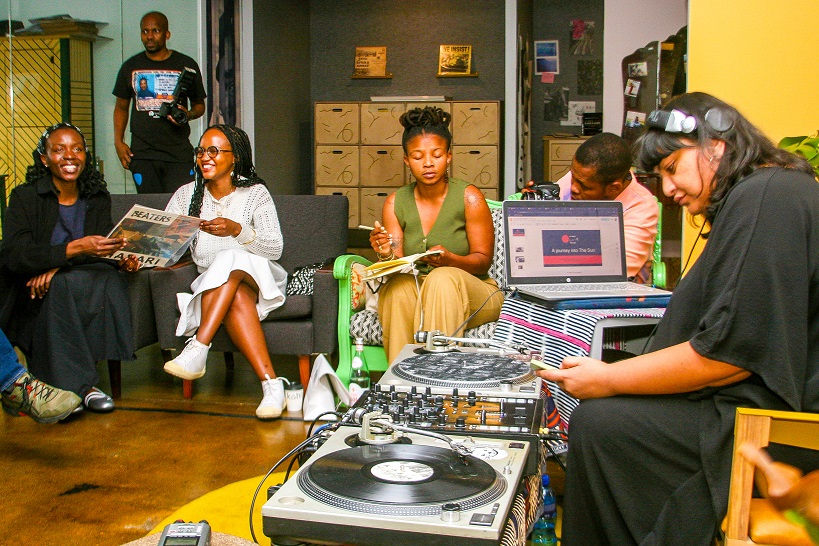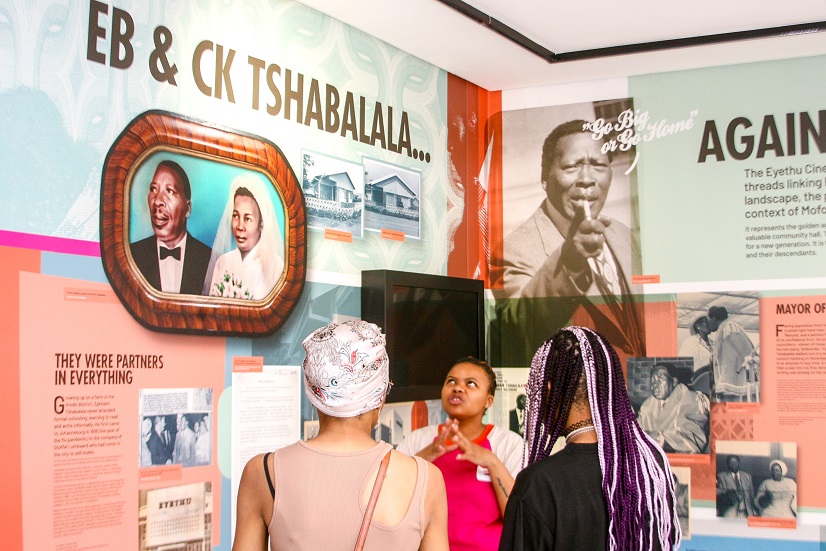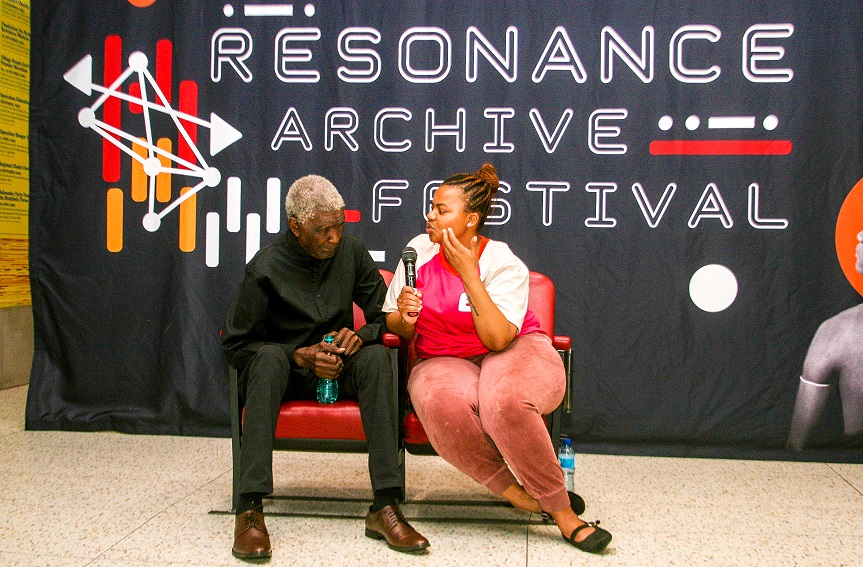THE weekend segueing winter into early spring experienced the staging of the inaugural Resonance Archive Festival – a cultural event which brought together filmmakers, artists, academics, historians and cultural practitioners to reflect on the past, question the present and shape future memory through film screenings, music events, exhibitions, symposiums, panel discussions and a cultural walk – at multiple participating venues across the City of Johannesburg metropolitan area, during four days betwixt August 27 and 31 of 2025.
Organized by Anaphora Films – a Johannesburg-based TV and video production entity specializing in documentary films – in association with The South Festival of Memory and key partner Eyethu Heritage Hall, the event occurred across the metropolis at, Cinema Nouveau, The Bioscope, The Market Photo Workshop, The Library of Things We Forgot to Remember, the Magic Lightbox Company, The Forge, Untitled Basement and the Eyethu Heritage Hall.
Making its debut on the Joburg art scene through a celebration of archives, history and heritage, the festival commenced at The Bioscope in Braamfontein with the double-bill screening of the films, 1927’s Siliva the Zulu and 1953’s The 37th Bride – a film starring Miriam Makeba in the role of an urbane mission school teacher who had to reckon with implications of a possible forced marriage to an influential chief.
The Thursday afternoon of the 28th thereafter saw the Market Photo Workshop in Newtown hosting a screening of Thokoza-raised filmmaker Nhlanhla Mthethwa’s documentary film, Sam Nzima: A Journey Through His Lens. An endeavour Mthethwa described as akin to “standing on the shoulders of the people who were there before us” – festival-goers beheld a compelling chronicle of the photographer who recorded the evocative image of a dying Hector Pieterson during the June 16, 1976 Soweto Students Uprisings.
In the film, Nzima described the photograph – which Time Magazine later ranked among its 100 Most Influential Images of All Time – as a “blessing and a curse” which, although bringing him fame, ended his journalism career and resulted in his harassment by apartheid securocrats who were ordered to “shoot at me and kill me.”
The ill-treatment eventually forced him to leave Soweto and settle at a distant village in the then Eastern Transvaal.
Continuing on the Struggle photographer perspective, Friday the 29th had The Bioscope screening Haitian filmmaker Raoul Peck’s documentary film, Ernest Cole: Lost and Found. A stirring account, Peck’s doccie narrates consequences of Cole’s exposure of the horrors of apartheid through his probing photography.
Aged merely 27, Cole would end up fleeing South Africa on a one-way exit and rendered personanon-grata from a country he described as a “living hell” from which he had to escape – subsequent the publication of his crack tome, House of Bondage.

The morning of Saturday the 30th had the fest’s focus shifting to Soweto where the Eyethu Heritage Hall kicked off a bustling weekend programme with the Tshabalala Walk of Remembrance which retraced the lasting footsteps of Soweto’s erstwhile mayor ET Tshabalala and his wife Kinini – with the walk’s route encompassing streets named after the power couple as well as their house located adjacent to the new family-owned Eyethu Shopping Centre in Mofolo Central.
Thereafter, the complex’ parking lot hosted a market celebrating the Tshabalala family’s entrepreneurial legacy incorporating businesses which were once firsts of their kind in Soweto.
With the festival coinciding with the 56th anniversary of the now defunct cinema’s opening back in August 30, 1969, the current Eyethu Heritage Hall was the venue for the screenings of, among a selection of rare films, Gibson Kente’s resistance film, How Long – a drama about township life under apartheid which, in order to avoid apartheid censorship, was produced in Kente’s native King William’s Town and got promptly banned after one public screening at Eyethu Cinema – 49 years after its premiere!
Among its cast, it featured the actor Peter Sephuma, who partook in a post-show discussion alongside playwrights Duma Ndlovu and Makhaola Ndebele – at the film’s other showing at Cinema Nouveau.
Concurrently whilst the Soweto programme continued with a discussion on resistance cinema between film director Karabo Lediga, actress Mmabatho Montsho and Nomsa Mazwai, The Library of Things We Forgot to Remember on Braamfontein’s 44 Stanley had Cape Town-based journalist-DJ-archivist-record collector Atiyyah Khan treating attendees to a sonic session spinning vinyls from The Beaters to Abdullah Ibrahim whilst regaling them about the Joburg of Rashid Vally and his Kohinoor Record Bar.
With the author of, From Kippie to Kippies & Beyond, viz Sam Mathe and Rashid Lombard’s son Shadley in attendance, the Actonville-raised Khan demonstrated why she has carved a niche as an events-curator who communicates through sound, as – in between spinning a selection of vinyls within a space adorned with yesteryear furniture such as an antiquated coal stove, cupboards and wall décor – she narrated nostalgic anecdotes of how Ibrahim coined the As-Shams Record Label and the music from Kohinoor permeated onto the city scape to mingle with aromas from adjacent spice shops and Kapitan’s restaurant.
Sunday the 31st back at the Eyethu Heritage Hall had Sol Rachilo – the protagonist in Charlie Steel, one of the rare films – interviewed for a podcast by ET’s granddaughter Lerato, in front of an audience which included Hugh Masekela’s daughter Motlalepula.
The intergenerational rendezvous happened before the screening of the 1984 flick in which the now nonagenarian Rachilo acted the role of a private investigator hired to recover a kidnapped-for-ransom victim.
Its showing was preluded by Dilemma, the clandestinely produced film based on Nadine Gordimer’s then banned novel, A World of Strangers, about a young English businessman who befriends a black South African (portrayed by Zakes Mokae) and subsequently discovers the prevailing racial prejudices of the local white population.
Close onto midnight on the 31st at Untitled basement in Braamfontein, drummer Tumi Mogorosi and vocalist Gabi Motuba – who led an improvised music quintet which explored the music of black American music couple Abbey Lincoln and Max Roach and provided sonic interpretations of the films Dilemma and Soundtrack to a Coup d’État’ – brought the curtain down on a debutante’s renaissance!
All images Jacob MAWELA (ET’s granddaughter, Lerato Tshabalala limned conversing with Sol Rachilo at the Eyethu Heritage Hall during the Resonance Archive Festival).


